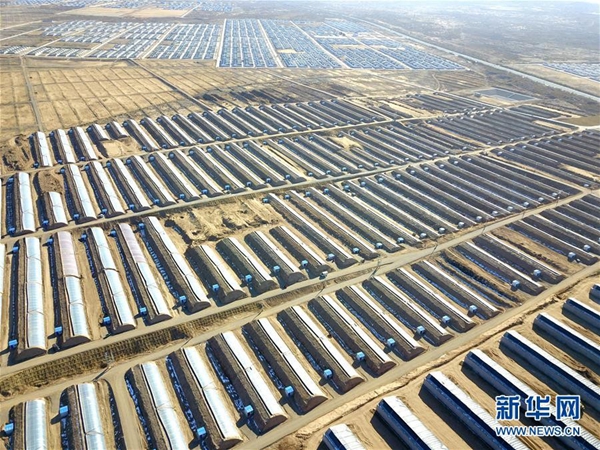Moving into prosperity: Wuwei's story of ending poverty
- By Liu Jianing
 0 Comment(s)
0 Comment(s) Print
Print E-mail China.org.cn, January 12, 2021
E-mail China.org.cn, January 12, 2021
People who lived in the vast mountains of Wuwei, northwestern China's Gansu province, never imagined that someday they could move into a new world. Their lives have totally changed - from the houses they live in, to the food they eat, the jobs they do, and the money they earn.
In the past, residents had to drink unfiltered water from the well; but now they use water from the taps. Before, there were muddy and rugged roads in the mountains; but now there are wide and clean roads, and the traffic is convenient.
Good living like a decent house and stable income was once beyond Wang Peijie's imaginations, but it has been turned into reality.
Wang used to live in an isolated village deep in the mountains, where the land was rigid and the roads were rough. Good harvests were rare, and the family's income was unsatisfying and their lives difficult.
The harvest of potatoes was all decided by the weather. Wang's family had a piece of land covering over 20 mu (1.33 hectares). They could barely get by with the money they earned, though they worked hard enough to farm the land. The house they lived in for several decades had several cracks, but they just covered them with a layer of thin mud to save repair costs.
Thanks to China's poverty reduction policies, Wang's family moved in early 2019 to Kangning New Village in Gulang county of Wuwei, a village built by the government to relocate people from nearby inhospitable areas. Wang paid 10,000 yuan for a flat of over 100 square meters. The new village has everything in it, such as schools, hospitals, supermarkets, and common areas. Life here is convenient. "We have never seen and even thought of these before," said Wang when he first moved into the village.
From 2001 to 2019, 181,500 people have been relocated from the mountains in Wuwei and started their new lives.

Moving out of the mountains was just the first step to ending poverty. Residents are creating better lives with their own hands. Follow-up support from the government has also provided benefits to those residents.
New accommodation means new jobs. Local government helped Wang to build a greenhouse and a livestock shelter. The facilities are run by leading companies, and Wang can earn dividends of 3,000 yuan every year.
The government also arranged a job of forestry protector for Wang shortly after he moved into the new house. Wang's son drives the ambulance for a nearby hospital. The whole family can earn a salary of 30,000 yuan in total. The government also provides subsidies of 20,000 yuan for Wang's family each year, according to deputy head of township Feng Kun.
The government has spent much in developing industries, Feng said. More than 2,500 greenhouses have already been built in the relocated areas. Various jobs are available for villagers like positions in special factories for poverty reduction and public services.
Sitting inside his warm house, Wang made plans for the future. "Once our livestock shelter is finished, I would like to raise some sheep because the price of mutton is good and the income must be great."
Many other residents have similar plans. In Fumin New Village, another relocation place, a couple busied themselves in a winter shelter for sheep. "We have raised 200 sheep and managed three greenhouses," said Zhang Baixiu. Every day at 7 a.m., she and her husband rush to the shed and feed the sheep, then go to the greenhouses to take care of the vegetables. At lunchtime, they rush back home to eat and bring water to the sheep. "Now the policies are favorable, and our lives are full of hope," said Zhong Huakui, Zhang's husband.

Breeding and planting are leading industries in Fumin New Village, and other jobs are also provided. Therefore, residents here can rest assured and make a good living.
An agricultural company has constructed a demonstration base here and planted tomatoes, cucumbers, muskmelons, and color peppers. Through technological training, poverty-stricken farmers have constructed 220 greenhouses and are sure to have satisfying income.
In Wuwei, the secret to a happy life is simple: comfortable houses and fulfilling work.





